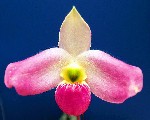
In 1998, many orchid collectors were excited to learn about the discovery of Paphiopedilum vietnamense, an orchid species previously unknown outside of Thai Nguyen Province in Vietnam.
In a frenzied rush to add this species to their collections, some unscrupulous orchid enthusiasts illegally exported specimens from Vietnam without CITES certification. While many illegally smuggled plants became available on the black market, some were seized by customs authorities.
Under the CITES convention, seized plants are either returned to the country from which they were smuggled or placed into a designated Plant Rescue Center by CITES authorities. When an illegal shipment of Paphiopedilum vietnamense plants was seized in 1999, the U.S. Botanic Garden agreed to accept and care for the plants.
As a Plant Rescue Center, the USBG felt a responsibility to not only care for the confiscated specimens of Paphiopedilum vietnamense, but to make an effort to contribute to the conservation of the species as a whole.
In an effort to cool the demand for wild-collected specimens from decimated native populations of Paphiopedilum vietnamense, the U.S. Botanic Garden has collaborated with a commercial orchid grower and the U.S. Fish and Wildlife Service to bring this orchid into legal cultivation.
Seedlings from plants held at the U.S. Botanic Garden are being grown in accordance with CITES regulations and offered to botanical gardens and the general public. It is hoped that by making plants legally and readily available at a reasonable price, illegally collected plants will be devalued and pressure on wild populations will decline.